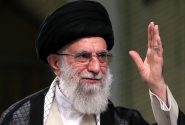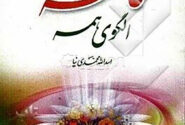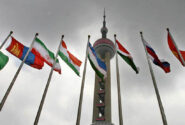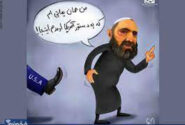The history of holding a referendum in Iran
The history of the issue of referendum in Iran goes back to 1332. In this year, the representatives in favor of Dr. Mohammad Mossadegh resigned in support of maintaining his government and dissolving the parliament. This caused the parliament meetings to not reach the quorum and not be held. In this situation, Dr. Mossadegh held a referendum on the issue of dissolving the parliament and maintaining the government. This was the first referendum in Iran’s political history. A referendum which, of course, led to an Anglo-American coup against the national government less than a week later. Before holding this controversial referendum, which was opposed by many scholars and political groups, the then chairman of the National Council advised Mossadegh: “There is no record of a referendum in the laws, and the vast majority of representatives are against it, and it is better to resolve this issue through mediation and remove this ambiguity.” However, on August 21, 1332, Mossadegh officially announced the result of the referendum, which means “retaining the government and dissolving the parliament” and asked Mohammad Reza Pahlavi to sign the order for holding new elections. But he did not approve this referendum. In this way, the result of the first referendum in the history of Iran was completely in favor of Mossadegh, but only four days later it led to his overthrow.
Almost a decade after Mossadegh’s referendum, it was Mohammad Reza Pahlavi’s turn to put what he called the White Revolution to a referendum. On the 6th of Bahman 1341, a national referendum was held to ask for opinions on the six principles proposed by the Shah, known as the “White Revolution”. The White Revolution, or as the supporters of the monarchy called it, “the revolution of the king and the people”, was the title of a series of economic and social reforms during the reign of Muhammad Reza Pahlavi, which was implemented simultaneously with the prime ministers of Ali Amini, Asadullah Alam, Hassan Ali Mansour and Amir Abbas Hoyda. In the first stage, the White Revolution consisted of six principles that Mohammad Reza Shah Pahlavi announced to the farmers and the public at the National Congress of Farmers in Tehran on 21 January 1341. On the 6th of February 1341, in a national referendum that was opposed by the clerics, the six principles of the White Revolution were put to a public vote and approved. The six principles of the first white revolution that Mohammad Reza Shah Pahlavi introduced in the winter of 1341 at the Congress of Farmers were as follows: “Agrarian reforms and abolition of the lord and serf regime, nationalization of forests and pastures throughout the country, sale of shares of state factories as a support for agrarian reforms, workers’ participation in the benefits of production and industrial workshops, amendment of the election law in order to give women the right to vote and Creation of Knowledge Corps in order to implement general and compulsory education.
Mohammad Reza Shah first stated these six principles as the principles of the White Revolution and gradually added 13 more principles to it. Critics believed that the principles of the White Revolution were designed by the United States and recommended to the heads of countries affiliated to the West and the Third World, and were planned without considering the specific political, economic, social and cultural conditions of Iran. The government of Mohammad Reza Pahlavi was overthrown 16 years after this referendum was held, and some theorists considered one of the most important reasons for his downfall to be the consequences of the implementation of the White Revolution. . 12th century April 1358 was the day of the announcement of the results of the referendum on the type of government after the Islamic revolution, during which 98.2 percent of the people of Iran voted yes for the “Islamic Republic”. Although the people of Islamic Iran had put the slogan of independence, freedom, and Islamic Republic at the top of their slogans during their revolutionary campaigns, but in order to confirm the fruits of their Islamic campaigns, on the 10th and 11th of April 1958, they voted for the “Islamic Republic” by attending the polls. They voted decisively.
Before that, some groups and political currents gave various proposals such as a republic (without Islamic restrictions) or a democratic republic, etc. for the type and form of the future government. They established the Islamic system.
Imam Rahal’s message on the occasion of this day was as follows: “The morning of Farvardin 12, which is the first day of God’s rule, is one of our greatest national and religious holidays, and our nation must celebrate this great day and keep it alive. The day when the palace congresses of the 2500-year-old Taghuti regime came down and the satanic rule ended forever. It ended and the government of the oppressed replaced it.”
After the victory of the Islamic Revolution of Iran, the democratic method of “referendum” for political decision-making was recognized in the Constitution of the Islamic Republic of Iran, and several principles of the Constitution refer to the subject of the referendum. In the sixth principle of the constitution, the referendum is considered one of the ways of running the country: “In the Islamic Republic of Iran, the affairs of the country must be managed by relying on public votes, through elections: Election of the president, representatives of the Islamic Council, members of the councils and the like, or through a referendum in cases specified in other principles of this law. Article 59 also specifies: “In very important economic, political, social and cultural issues, it is possible for the legislature to act through referendums and direct reference to people’s votes. “The request to refer to the general vote must be approved by two-thirds of the parliament’s representatives.”
Article 99 also says: “The Guardian Council is in charge of supervising the elections of the Assembly of Leadership Experts, the Presidency, the Islamic Council and referring to public votes and referendums.” Article 110 also refers to the referendum decree under the duties and powers of the leader, and article 123 also states: “The president is obliged to sign the approvals of the parliament or the result of the referendum after going through the legal procedures and communicating it to him and leave it at the disposal of the authorities for implementation.”
According to Article 132, “During the period when the powers and responsibilities of the President are vested in the First Vice President or another person who is appointed according to Article 131, ministers cannot be impeached or given a vote of no confidence, nor can they be renewed The opinion on the constitution or the referendum act. Article 177 also pays attention to a specific form of referendum and emphasizes: “The approvals of the Shura (Revision of the Constitution) after being approved and signed by the leadership, must be approved by the absolute majority of the participants in the referendum by referring to public votes.”
It should be noted that until now, the experience of the referendum has been used in three stages in order to stabilize the system of the Islamic Republic. The first referendum in Iran after the victory of the Islamic Revolution took place on the 10th and 11th of Farvardin 1358, and in this public referendum, the type of government system of Iran was determined by 98.2% of votes as “Islamic Republic”.
Although some political groups affiliated with the previous regime boycotted the referendum, the participation of the vast majority of the people in this referendum was a confirmation of the victory of the Islamic Revolution and the formation of the Islamic Republic in Iran.
In the text of the order of Mehdi Bazargan, head of the interim government, addressed to Haj Seyed Javadi, the then interior minister, regarding the holding of the first referendum in the history of the revolution, it is stated: “According to the decree of the leader of the Islamic Revolution of Iran, Imam Khomeini, to hold a referendum and ask the members of the fighting nation to determine the form of government of Iran, order that according to the plan of the referendum plan, action should be taken to hold it on April 10, 1358. The form of the referendum that was approved on 30th of Bahman The Council of Ministers has reached a question with two possible answers, yes or no.
Following the conclusion of the first referendum in the history after the revolution, on December 12, 1358, the first constitution drafted after the Islamic revolution was approved in a public referendum. This constitution was tested for a decade until on August 6, 1368, the constitution of the Islamic Republic was put to a public vote after the implementation of reforms and changes, which was approved by the people with the majority of votes.
It should be mentioned that before the last referendum in August 2018, a law consisting of 39 articles and 13 notes was approved by the Islamic Council in a public meeting on Sunday, May 4, 1368, and approved by the Guardian Council on 4.6.1368. .
Referendums held in the Islamic Republic of Iran
|
Referendum issue |
Time of holding |
Result |
|
Vote yes or no to the Islamic Republic |
۱۲ February 1358 |
Yes to the Islamic Republic |
|
Voting on the Constitution |
December 12, 1358 |
Approval of the Constitution |
|
Amendment of the constitution |
August 6, 1368 |
Approval of constitutional amendments |
Referendum law in the Islamic Republic of Iran
The first chapter – General
Article 1 – A referendum of the members of the nation is conducted in accordance with the provisions of this law in such a way that all sections of the society can freely express their opinion on an issue that is put to public vote in one of the following two ways:
A – Yes
B – No
Comment – Voting is done by means of special papers that will be distributed to the voters in the polling stations.
Article 2 – The Ministry of Interior, in coordination with the Guardian Council, will determine and announce the date of the referendum.
Article 3 – The supervision of the referendum is the responsibility of the Guardian Council.
The second chapter – the quality of holding the referendum
Article 4 – Referendum will be direct and public with secret ballot.
Article 5 – Every eligible person can vote only once inside the country by presenting his birth certificate and abroad with his passport.
Article 6 – Voting inside and outside the country is done in one day and its duration is 10 hours and can be extended if necessary.
Note 1 – It is the responsibility of the Minister of the Interior to determine the necessity and the extension of the voting period.
Note 2 – Voting must be done on one of the official holidays.
Article 7 – Radio of the Islamic Republic of Iran is obliged to broadcast educational programs about the referendum, as well as all relevant announcements and announcements that the Ministry of Interior or the central supervisory board of the Guardian Council deem necessary on the national or local network of the Radio of the Islamic Republic of Iran.
Article 8 – Law enforcement officers are obliged to create order and prevent any kind of disorder during the referendum and protect the funds.
Article 9 – Votes obtained through buying and selling, with the approval of the supervisory board or its representative, will be invalid, but will be considered part of the votes taken, and the matters will be recorded in the meeting minutes and the said votes will be attached to the meeting minutes.
Article 10 – In the following cases, with the approval of the supervisory board or its representative, the ballots are invalid and are not considered as part of the votes taken, and the matters mentioned in the meeting minutes will be attached to the meeting minutes.
۱- The fund does not have the seal of the referendum.
۲- There are excess votes on the number of tariffs.
۳- Votes of those who have not reached the voting age.
۴- Votes given with the birth certificate of deceased or non-Iranian people.
۵- Votes obtained by fraud (in tariffs, votes, meeting minutes, counting)
be
۶- Votes obtained with a different or fake birth certificate.
۷- Votes obtained with the birth certificate of those who are not present.
۸- Votes that do not have a referendum stamp.
۹- Votes obtained through threats.
۱۰- Votes that are not on legal ballots.
Note 1 – All the votes included in the minutes of the meeting, where the ballot box does not have ballot papers or tariff sheets, will be invalid and will not be considered part of the votes cast.
Note 2 – The number of redundant votes in paragraph 2 before the counting of votes, regardless of the type of vote, will be deducted from the total ballots.
Article 11 – The Ministry of Interior is responsible for the implementation of the Referendum Law and is responsible for the correctness of the process of holding it, and for this purpose, it can send agents to inspect and control the process of the referendum on a fixed or mobile basis to the cities, departments and branches of registration and vote collection, and the right to interfere in They do not have the supervision of the Guardian Council.
Article 12 – Committing the following acts is considered a crime:
۱ – Buy and sell votes
۲- Fraud and falsification in tariff papers or ballots or meeting minutes
۳- Threatening or bribery in the matter of referendum
۴- Voting with a fake birth certificate
۵- Voting with another birth certificate
۶- Voting more than once
۷- Disturbance in the referendum
۸- Increasing or decreasing votes or tariffs
۹- Fraud in voting and vote counting
۱۰ – Voting with the birth certificate of someone who is not present.
۱۱- Recommendation to cast a certain ballot by the members of the polling branch or any other person at the ballot box.
۱۲ – Changing and transforming or forging or stealing or destroying electoral papers and documents such as tariffs and ballots, minutes of meetings, telexes, telegraphs and telegrams
۱۳ – Opening or breaking the lock of the storage place and the seal and seal of the ballot boxes without permission
legal
۱۴ – Moving, tampering with, or destroying referendum documents without legal permission
۱۵ – Intimidation of voters or members of the registration and voting branch with or without weapons in the referendum
۱۶- Interfering in the referendum, with a fake position or document or in any illegal way
Note – If the crimes listed in the above article cause the process of the referendum in one or more branches of registration and vote collection to deviate from its legal path, and the general outcome of the referendum is effective, the matter will be submitted by the Ministry of Interior to the Guardian Council to the Central Board. The supervisory board is announced.
Article 13 – The judicial organization of each city or department in order to prevent the occurrence of crime, while coordinating with the supervisors of the Guardian Council and the executive board, takes the necessary measures within the scope of the usual regulations.
Article 14 – Voters must have the following conditions:
۱- Citizenship of the Islamic Republic of Iran
۲ – Entering the age of 16 years
۳ – Absence of insanity
The third chapter – Executive Board
Article 15 – Immediately after the issuance of the order to start the referendum by the Ministry of Interior, the governor has issued the order to form the executive committees to the prefects and he is obliged to appoint the executive committee of the county referendum within three days with the head of the registrar and the prosecutor or his representative and 8 people as members. to form trustees.
Tasra – Twenty-four local trustees convened a meeting within two days based on the written invitation of the local governor or prefect, and after the presence of two-thirds of the invitees in the presence of the supervisory board from among themselves or from outside, eight people were appointed as main trustees and five As alternate trustees, the executive board is elected by secret ballot and relative majority of votes.
Article 16 – The number of members of the executive boards of the city and department, their quality, and the deadline for their formation are the same.
Article 17 – The executive board of the city carries out all the referendum affairs of the central part.
Article 18 – The trustees of the executive board must have faith and practical commitment to Islam and the constitution, good reputation and literacy, and must not be effective factors in consolidating the former regime and not affiliated with illegal groups.
Article 19 – After accepting the membership, the members of the executive board are required to participate in the meetings and perform the relevant legal duties.
Article 20 – The executive board of the district convenes a meeting immediately after the election of the trustees and determines the number and location of the registration and voting branches and announces it to the governor through the head of the board (district head) for the proposal in the executive board of the city.
Article 21 – The meetings of the executive boards of the city and the district will be formalized with the presence of two thirds of all members and the decision will be taken by the absolute majority of those present.
Article 22 – The executive board of the city, after determining the location of the registration and voting branches and reviewing and confirming and approving the approvals of the executive boards of the departments regarding the number and location of the registration and voting branches, 9 days before the day of voting, start publishing the referendum notice. It contains the date of holding, voting hours, conditions of voters, crimes and violations and penal provisions and the place of registration and voting throughout the city.
Note – In case of some problems, with the approval of the Ministry of Interior, the deadline will be reduced from 9 days to 7 days.
Article 23 – The executive boards of the city and district, after the publication of the referendum notice, for each branch of registration and voting, select five local trustees who are literate and introduce them to the governor or district head for issuing a ruling.
Article 24 – The executive board, with the approval of the executive board of the city, can establish mobile voting booths for remote and mountainous areas and far distances and places where it is not possible to set up registration and vote booths. The executive board of the city can, if it deems it necessary, take action on the establishment of mobile voting branches in the center of the city and the central part, and both cases must be notified to the supervisory board, and also a representative of the supervisory board is present with the mobile fund and the route of the fund circulation in Record and approve minutes.
Article 25 – In the embassies and consulates and political representation of Iran abroad, the executive committee of the referendum is headed by the ambassador or the consul general or the highest official of the political representation and the membership is three of the senior employees of the embassy, consulate or political representation and 5 people of faithful Iranians. To the Islamic Revolution, a resident of that country is elected and invited by an ambassador or consul general or a political representative.
Article 26 – The executive board of the above month issues the minutes of the meeting after the end of taking votes and reading the votes. The ambassador or the consul general or the highest official of the political representation is obliged to immediately announce the result to the Ministry of Interior through the fastest possible means of communication through the Ministry of Foreign Affairs.
The fourth chapter – Complaints and handling
Article 27 – The Guardian Council shall send its definitive opinion to the President for signature within one week and, if necessary, no later than ten days after receiving the result of the referendum, and after signing, the President shall announce the final result to the Ministry of Interior, and the Ministry of Interior shall announce the final result through mass media. will inform the people.
Article 28 – The executive boards are obliged to accept the complaints received within two days after the announcement of the referendum result and deal with them within 24 hours in the joint meeting of the executive board and supervisors of the Guardian Council in the relevant city, and report the results to the Ministry of Interior.
Note 1 – Those who have a complaint about the way the referendum was held can also submit their documented complaint to the supervisors of the Guardian Council or the secretariat of this council within three days from the date of receiving the vote.
Note 2 – Complaints that have the details of the complainant or complainants including the name, surname, occupation, full address, phone number and original signature of the complainant will be processed.
Note 3 – Planning and investigation of complaints about people is confidential and its disclosure is prohibited.
Note 4 – Inspectors send their reports exclusively to competent legal authorities.
Article 29 – After examining the complaints and reports, the executive board, if it determines that the referendum affairs in one or more branches have deviated from their normal flow and has not been carried out correctly, with the approval of the Guardian Council, it will declare the referendum in one or more branches invalid.
The fifth chapter – Punishment
Article 30 – Punishment for violation of paragraph 15 of article 12 is determined by observing the conditions and possibilities of the wrongdoer, the frequency and degrees of the crime, the degrees of discipline from admonitions, reprimands, threats, and degrees of punishment in the following order:
A- If the perpetrator causes terror without a weapon, he will be sentenced to 74 lashes.
B – If the intimidation is caused by incitement or by direct action with a weapon, and war does not apply, he will be sentenced to 74 lashes and a maximum of 2 years in prison.
Article 31 – The punishment for someone who interferes in the referendum by adopting a false position (topic of paragraph 16 of article 12) will be up to 50 strokes of the whip, according to the conditions and possibilities of the offense and the frequency and degrees of the crime and the degrees of discipline. If the perpetrator of a document has falsified a document in this case, he will be punished for forgery and falsification, and if his interference is effective in the fate of the referendum and disrupts the referendum process in a district, a city, or a province, the perpetrator, in accordance with the conditions and possibilities of the false and The frequency and degree of crime and the degree of discipline from preaching and reprimanding and threats and degrees of punishment will be sentenced from one to five years of imprisonment.
Article 32 – The administrative members of the executive board (governor or district head, head of civil registrar, prosecutor or his representative) in case of violation of Article 19 of this law, subject to the conditions and possibilities of the offense and the frequency and degrees of the crime and the degrees of discipline from reprimands, reprimands, threats and degrees. Tazeer will be sentenced to the penalty of salary deduction for up to one-third from one month to six months by the ruling of the competent authorities, and for the rest of the members, they will be sentenced to be deprived of up to two elections from being members of the executive and supervisory boards and polling branches.
Article 33 – In order to maintain complete impartiality, the supervisors of the Guardian Council and the members of the executive and supervisory boards are obliged to maintain complete impartiality during their term of responsibility.
Commentary – The punishment for violation of the above article will be six months to one year of dismissal from government service or six months to one year of imprisonment, subject to the conditions and possibilities of the offense and the frequency and degrees of the crime and the degrees of discipline from preaching and reprimanding and threats and degrees of punishment.
Article 34 – The punishments of this principle are not exclusive to the types mentioned in this law, and the judge in any case can sentence the offender to the aforementioned punishment or any other appropriate punishments that are mentioned in the Penal Law.
Article 35 – The president is obliged to sign the result of the referendum after going through the legal procedures and communicating it to him within one week at the latest and provide it to the officials for implementation.
Article 36 – Referendum will be held at the suggestion of the president or one hundred representatives of the Islamic Council and approved by at least two-thirds of the total representatives of the Islamic Council.
Article 37 – The Guardian Council will supervise the referendum according to the Presidential Election Supervision Law.
Article 38 – The Ministry of Interior prepares the executive regulations of the referendum and implements them with the approval of the Council of Ministers.
Article 39 – This law is effective from the date of approval
tenant





















